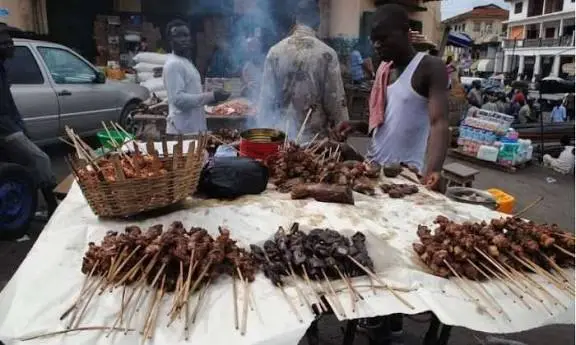Damongo: Three arrested for breaching Chief’s embargo on sale of ‘Chinchinga’

Three residents of Damongo in the Savannah Region have been arrested for allegedly violating a directive issued by Damongowura Boresah Kelly Seidu I, the Paramount Chief of the Damongo Traditional Area, banning the sale of chinchinga (khebab) outside designated facilities.
The chief, earlier this month, declared that any animal slaughtered outside the West Gonja Municipal Assembly’s abattoir would be considered stolen.
The directive is part of a comprehensive strategy to combat the persistent theft of livestock, which has become a significant source of tension in the area.
Confirming the arrests to Channel One News, Mbonwura Lukman Salifu Soldier, the Youth Chief of Damongo, revealed that a tip-off led to the discovery of a cow slaughtered in a private residence in clear breach of the ban.
“Upon hearing the information, Damongowura Boresah Kelly Seidu I sent a delegation through me to confirm the slaughtering of a cow in an individual’s residence in Damongo,” he said
Several livestock owners in Damongo and surrounding communities have complained of losing sheep, goats, and cattle, with many pointing to an organised theft syndicate believed to be supplying unregulated meat sellers.
The situation has not only threatened livelihoods but also raised public health concerns, as meat slaughtered outside the abattoir bypasses inspection and hygiene standards.
The Damongo Traditional Council insists the chief’s directive is not meant to inconvenience residents but to safeguard community resources and protect farmers who depend on livestock for income.
By ensuring that all slaughtering is centralized at the abattoir, the chief hopes to track meat supply chains, discourage theft, and improve food safety.
The three suspects remain in police custody as investigations continue. Authorities say more arrests could follow if others are found to be defying the ban.
Meanwhile, community members are being urged to comply with the directive to avoid sanctions.
Local opinion leaders have also thrown their weight behind the chief’s decision, describing it as a bold step to restore order in the livestock trade and curb criminal activity.

